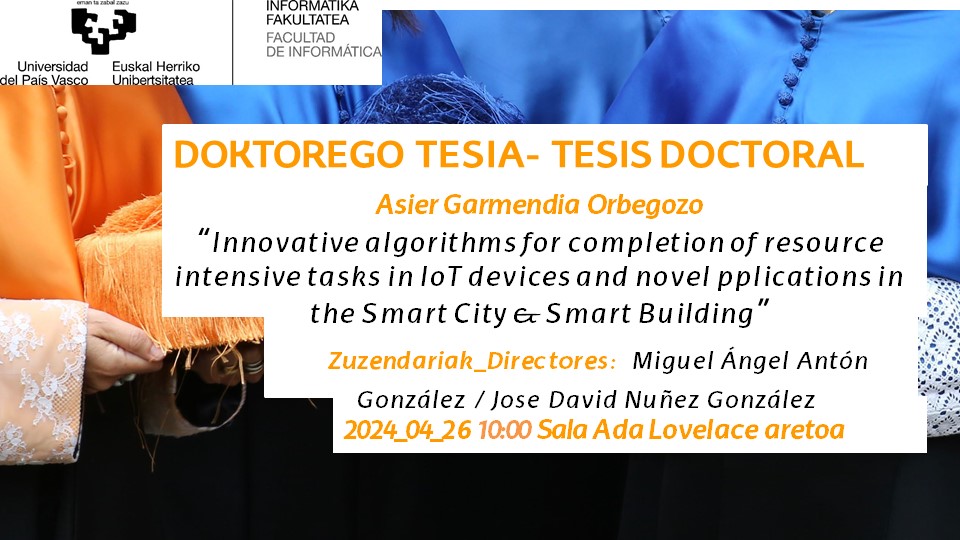26_04_2024; 10:00 Defensa de Tesis Doctoral Asier Garmendia
Fecha de primera publicación: 24/04/2024

Asier Garmendia Orbegozo: “Innovative algorithms for completion of resource intensive tasks in IoT devices and novel pplications in the Smart City & Smart Building”
Zuzendariak_Directores: Miguel Ángel Antón González / Jose David Nuñez González
26_04_2024; 10:00 Sala Ada Lovelace aretoa
Abstract:
"This thesis has been focused on the topic of Machine Learning, where we have
been working on the refinement of different methods from the literature, and
diverse applications related to Smart Cities and Edge Computing. Precisely, the
main contributions have been made by improving algorithms to ease their computation
in resource constrained devices, establishing policies for orchestrating
load distribution between these devices and the acquisition of new knowledge
based on the data obtained by these devices through long periods of time, opening
the way to novel applications.
The first work focuses on the refinement of methods for reducing the Neural
Networks on resource constrained devices. Due to the lightweight nature of
these devices it is not viable to carry out computation of these algorithms on
them, so that, variants for reducing or modifying these algorithms have been
proposed. The principle of backpropagation of the relevances of components of
the network has been imposed to a relevant work from the literature to offer a
new way for shrinking Neural Networks.
The second contribution is related to the paradigm of offloading of tasks in
Edge Computing between different computation centers. The offloading policy
that ensures load balance and computation of all tasks within the required
latency is pursued. We have implemented a Graph Neural Network for reproducing
the local network structure, including the devices’ properties and
network state as features of the graph. In parallel, we used the RL technique
Deep Q-Network due to the constant updates of the network environment, and
the ability of RL algorithms to learn these constant changes of the networking
environment. We tested both task offloading policies in a well-known simulator,
and we outperformed the default policies of the simulator.
The last work consists of a novel application for Smart Cities based on the
readings of sensors located outside different buildings in a city. These data,
collected over several months, was a source of new knowledge about the essence
of these buildings. Sensor reading patterns reflect the pedestrians activity in
these buildings. Consequently, a classification of buildings was achieved based
on the typology of buildings surrounding these sensors and the pedestrians’
mobility pattern at different time intervals of different days of the week."


